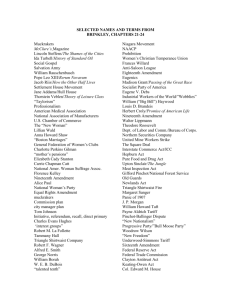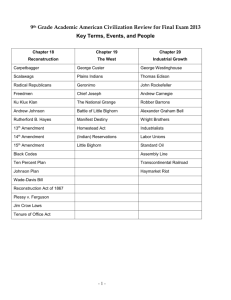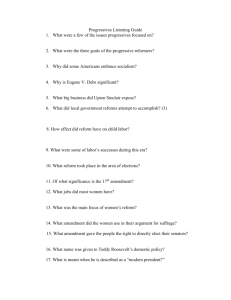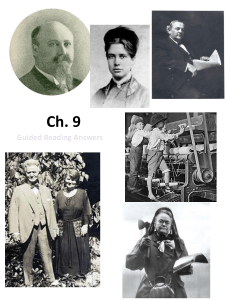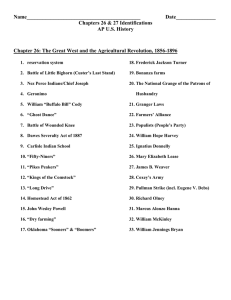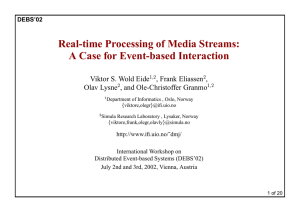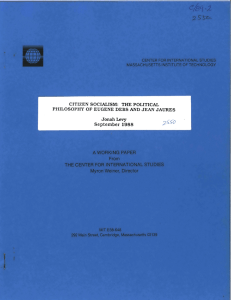American History FINAL EXAM Part I
advertisement
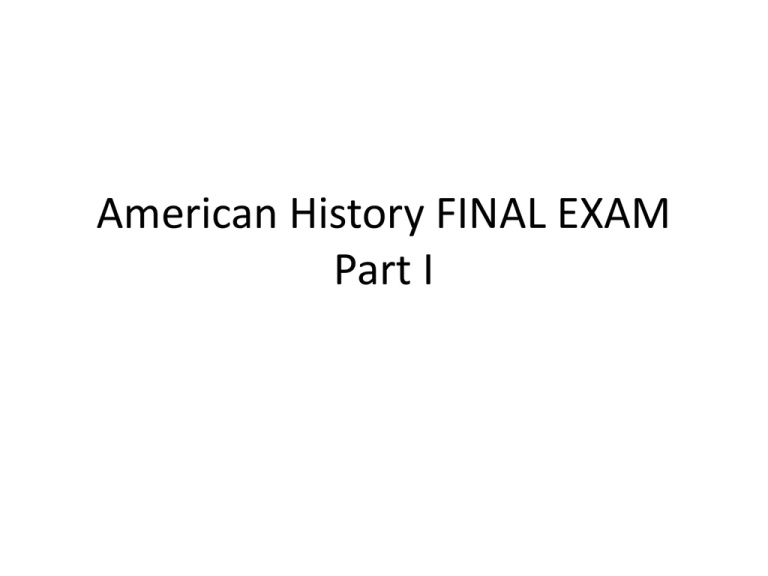
American History FINAL EXAM Part I Chapter 18 Child Labor Child labor was at its peak during the Industrial Revolution Children worked in horrible working conditions and received horrible treatment and pay The reason so many children worked was to help their family financially because so many families lived below the poverty line Chapter 18 Knights of Labor Made emergence in the 1880s Fought for an *8 hour work day *termination of child labor, *equal pay for equal work *a graduated income tax Chapter 18 AFL Stood for American Federation of Labor It was made up of skilled workers then eventually unskilled workers joined Fought for *40 hour work weeks *overtime pay *pensions and *medical benefits Chapter 18 IWW Stood for Industrial Workers Of The World Is an international labor union Fought for overthrowing capitalism and believes people earn what they work for Ch.18-Eugene V. Debs • Debs was a labor organizer and also a socialist candidate for president 5 times. Debs successfully united railway workers into the first industrial labor union in the united states. He became president of the American Railway Union in 1893. Debs was sent to jail though Mother Jones • Mother Jones was a strong supporter for worker’s rights. • She inspired many people and convinced many others to join her cause to protect Children • Some of Mother Jones’ methods of organizing were unique for her time. Triangle Shirtwaist Fire • A fire that happened at the Triangle Shirtwaist factory in New York that killed 146 people. It was a tragic event for people in New York and the families of the workers who died in it. • This event exposed the poor and hazardous conditions of high-rise factories, which led to new more safe factories being made. Gilded Age “Showy on the outside but corrupt on the inside!” • The Gilded Age was the growth of industry and Robber Barrons in America as well as the large wave of immigrants that were coming over to America. • During this time period the production of iron and steel increased drastically. All industries were getting rich as well as the men in charge of them. Civil Service/Merit System The merit system uses, qualifications, testing, job performance, and, criteria to select hiring It was made to improve parts in the government that were staffed by the spoils system or political patronage so they couldn’t give there friends or unqualified people a job Patronage Also known as the SPOILS SYSTEM Awarded uncertified people or supporters of the candidate government jobs as award for voting for them or doing them favors Pendleton Act A federal law that establishes rules and regulations regarding who could be hired and hold federal jobs with in the federal government resulted because of the assassination of President McKinley Women's Suffrage Womens suffrage is the fight for the right to vote and for women to be able to run for office. They protested, they marched and had rallies Finally in 1920 the 19th amendment was ratified by Tennessee on august 18th and becomes a law on August 26th Ch. 18 Susan B. Anthony She founded the NWSA – National Woman Suffrage Association making many attempts to unite women in the labor movement for the suffragist cause. National Women’s Party The NWP founded by Alice Paul was an organization that fought for women’s rights particularly the right to vote. Chapter 18 Ideas supported by Populists Many of the ideas and goals of the Populists would become laws later on in American history. Direct election of US senators by popular vote, rather than by state legislatures. –17th amendment introduced the ideas of the initiative, referendum and recall which were added to many state constitutions. government ownership of railroads and the telegraph. a graduated income tax--they felt the wealthy should pay a higher percentage in taxes than the middle class or poor. 16th amendment Chapter 18 Ellis Island Ellis Island developed from a sandy island that barely rose above the high tide markers into a hanging site for pirates, a harbor fort, and finally into an Immigration Station For mainly European immigrants Chapter 19 TENEMENTS Mostly 1 bedroom apartments that an entire family was shoved in and many families took it because it was better than nothing even though the were disgusting and cramped. Chapter 19 De Facto Segregation Pretty much natural segregation because there were laws that made segregation , but in reality this type was just natural. Examples: Little Italy, Chinatown Political Machine A small political organization in which an authorized boss or small group commands support from a corps of supporters and businesses, receive rewards for their efforts Boss Tweed American politician most remembered for being the “boss” of Tammany Hall, a democratic party political machine. Melting Pot Theory The melting pot theory is the idea that people of many cultures and beliefs come to America and unite and learn the belief systems of the American people. Nativism The political favoritism of the established Americans, and the discrimination of new immigrants. “opposition to immigration” •People felt the immigration of Asians threatened white wages •The term “Yellow Peril” was spread through newspapers Imperialism • When larger, more powerful countries take over smaller countries politically and economically. • Used in history for centuries Yellow Press • “Yellow Journalism” • Made up or exaggerated information in newspapers of magazines • Technique to sell more newspapers Spanish-American War • Caused by the American involvement in the Cuban War of Independence • Rough Riders were involved • Battle of San Juan Hill • Ended by the Treaty of Paris 1898 Spanish American War Results Cuba became independent US would take over Puerto Rico and Guam US gave Spain 20 million for the Philippines Common Wealth Federation of states Puerto Rico becomes a common wealth They were able to make their own laws and handle finances They were allowed to move freely to the US Protectorate Country who’s affairs are controlled by a stronger power US tried to take Spain's place in controlling Cuba Panama Canal Water passage between Atlantic and Pacific Ocean US had rights to build and control it President Roosevelt gave money to Panamanian rebels who overthrew their government and then we built the canal. Dollar Diplomacy A policy aimed at furthering the interests of the United States abroad by encouraging the investment of U.S. capital in foreign countries. The biggest example of this in the early 1900’s was when we bought the Philippines from Spain William McKinley adopted this policy Big Stick Diplomacy This policy was adopted by Teddy Roosevelt This was the act of doing diplomacy by showing your countries strength without saying anything and having an army to back it up with An example would be the Great White fleet Pure Food & Drug Act This act was passed to make food and drugs safer for the people This act forced companies to LABEL what was in their products This act cracked down on unhealthy food & bad medicine Prohibition The illegalization of the distribution and consumption of alcohol This was created with 18th amendment and eradicated by the 21st amendment Muckrakers Muckrakers- investigative reporters Muckrakers were Upton Sinclair- exposed meat packing industry, Ida Tarbellexposed oil monopolies, Lincoln Stephens- exposed big businesses, Jacob Riisexposed conditions in the cities Upton Sinclair– The Jungle Was a muckraker Wrote The Jungle Book about the poor conditions in the meat packaging industry Book helped pass the Meat Inspection Act a theory or system of social organization based on the holding of all property in common, actual ownership being ascribed to the community as a whole or to the state. When one country shares everything. The Government controls the economy and Businesses. Socialism A system in which the community rather than private individuals owns and operates the means of production and distribution. All members of the community share in the work and the products Promoted to eliminate capitalism Socialist party was formed off of this policy Capitalism Social system based on individual rights System of objective laws when freedom is applied to the sphere of production its’ result is the free market System of laissez-faire (freedom) A major accomplishment of this square deal was that monopolies were shot down. Another thing Roosevelt did was considered an accomplishment was helping businesses grow by REGULATING TRUSTS Pure Food & Drug Act The principles and practices of political progressives. Making your country better for ALL Moving Forward and bettering your economy and citizen’s lives. Progressive Party of 1912 nicknamed the Bull Moose Party from a quote by Teddy Roosevelt. When asked whether he was fit to be president, he responded that he was as fit as a bull moose. 1912 Election • Republican Party: President: William H. Taft • Democratic Party: President: Woodrow Wilson • Progressive Party: President: Theodore Roosevelt • Socialist Party: President: Eugene Debs • Winner: Woodrow Wilson • His campaign theme was “New Freedom”
